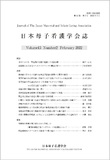Japanese
English
- 有料閲覧
- Abstract 文献概要
- 参考文献 Reference
抄録
【目的】父親の家事育児参加と、親性、性別役割分担意識、父親の妊娠・分娩への参加経験との関連性を明らかにし、助産師が父親の家事育児参加を促すためには、どのようなケアが効果的なのかの示唆を得る。
【対象と方法】就学前の6歳未満の子をもつ父親を対象とし倫理委員会承認後2020年9月Webで全国調査を行った。
【結果】283人の父親の平均年齢は38.0±6.3歳、子どもの人数は2人以下で86.9%、末子の年齢は3歳以下が73.8%だった。父親の平均家事育児時間は仕事の日で203.13±124.00分、休日で375.00±204.73分であった。重回帰分析の結果、仕事の日の家事育児時間には在宅勤務の頻度(β=0.236)、「社会的地位意識」(性別役割分担意識の下位尺度)(β=-0.172)、立ち合い分娩経験(β=0.106)、妻の勤務形態(β=0.099)が影響していた。休日の家事育児時間には「親役割の状態」(親性の下位尺度)(β=0.255)、新型コロナウイルス感染拡大前後での家事育児時間の変化(β=0.158)、末子の年齢(β=-0.136)、妊婦健診の付き添い経験(β=0.120)、親との同居(β=-0.113)が影響していた。
【結論】「親役割の状態」が高いと休日の家事育児時間が増加し、「社会的地位意識」が強いと仕事の日の家事育児時間は減少した。よって父親の「親役割の状態」を高めるために助産師は父親が育児に関心をもち育児能力を身に付ける支援が必要である。また「社会的地位意識」が高い父親には個別の性別役割分担意識を理解し支援方法を考えていく必要がある。また父親の妊娠・分娩への参加も影響力があったため、助産師は父親に妊娠・分娩への参加を促していく必要がある。しかし父親の置かれている環境・属性の影響も大きかったため、父親のニーズに合わせた社会の支援体制を整えていく必要もあると考えられた。
【Purpose】This study aims to determine whether the amount of time that fathers with preschool children spend on childcare and housework is associated with their parenting awareness, gender awareness, and participation in prenatal check-ups, parenting classes, and childbirth. The midwives can then get recommendations for effective care to encourage fathers' participation in childcare and housework.
【Subjects and Methods】An online survey was conducted for fathers with children aged < 6 years in September 2020, nationwide, after an approval from the IRB.
【Results】There were 283 respondents with a mean age of 38.0 ± 6.3; 86.9% of them had ≦ 2 children and for 73.8% of the respondents, their youngest child's age was ≦ 3.
On a workday, the mean time spent was 203.13 ± 124.00 minutes, and on a day off, it was 375.00 ± 204.73 minutes.
Multiple regression analysis found that the frequency of telework at home (β = 0.236), social status awareness (a sub scale of the gender awareness scale) (β = -0.172), having attended childbirth (β = 0.106), and how wives work (β = 0.099) were all associated with the length of the working day. On days off, the associated factors were the state of parenting roles (a sub scale of the parenting scale) (β = 0.255), the change in the amount of time fathers spent on housework and childcare before and after COVID-19 (β = 0.158), the youngest child's age (β = -0.136), having attended prenatal check-ups (β = 0.120), and extended households (β = -0.113).
【Conclusions】Fathers' time on a day off increased as the state of their parenting roles improved, while their time on a workday decreased as they had stronger social status awareness. This paper suggests that midwives should assist fathers with parenting roles by educating them on parenting skills. When assisting fathers, midwives must consider individual father's gender awareness, including strong social status awareness. They must also encourage fathers' participation in prenatal check-ups, parenting classes, and childbirth. Furthermore, it is believed that factors including fathers' work and family environments, which affect their participation in childcare and housework, necessitate social support for fathers' individual needs.
Copyright © 2022, The Japan Maternal and Infant Caring Association All rights reserved.


